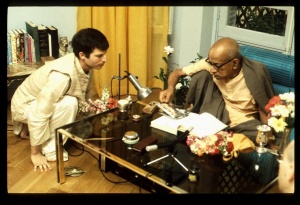CC Antya 6.309: Difference between revisions
m (1 revision(s)) |
No edit summary |
||
| Line 1: | Line 1: | ||
{{ | [[Category:Sri Caitanya-caritamrta - Antya-lila Chapter 06]] | ||
<div style="float:left">'''[[Sri Caitanya-caritamrta|Śrī Caitanya-caritāmṛta]] - [[CC Antya|Antya-līlā]] - [[CC Antya 6|Chapter 6: The Meeting of Śrī Caitanya Mahāprabhu and Raghunatha dasa Gosvāmī]]'''</div> | |||
<div style="float:right">[[File:Go-previous.png|link=CC Antya 6.308|Antya-līlā 6.308]] '''[[CC Antya 6.308|Antya-līlā 6.308]] - [[CC Antya 6.310|Antya-līlā 6.310]]''' [[File:Go-next.png|link=CC Antya 6.310|Antya-līlā 6.310]]</div> | |||
{{CompareVersions|CC|Antya 6.309|CC 1975|CC 1996}} | |||
{{RandomImage}} | |||
==== TEXT 309 ==== | ==== TEXT 309 ==== | ||
<div | <div class="verse"> | ||
ananta guṇa raghunāthera ke karibe lekhā? | :ananta guṇa raghunāthera ke karibe lekhā? | ||
raghunāthera niyama,—yena pāṣāṇera rekhā | :raghunāthera niyama,—yena pāṣāṇera rekhā | ||
</div> | </div> | ||
| Line 12: | Line 16: | ||
==== SYNONYMS ==== | ==== SYNONYMS ==== | ||
<div | <div class="synonyms"> | ||
ananta | ''ananta guṇa''—unlimited transcendental attributes; ''raghunāthera''—of Raghunātha dāsa; ''ke''—who; ''karibe lekhā''—can write; ''raghunāthera''—of Raghunātha dāsa; ''niyama''—the strict regulative principles; ''yena''—like; ''pāṣāṇera rekhā''—lines on a stone. | ||
</div> | </div> | ||
| Line 19: | Line 23: | ||
==== TRANSLATION ==== | ==== TRANSLATION ==== | ||
<div | <div class="translation"> | ||
Who could list the unlimited transcendental attributes of Raghunātha dāsa? His strict regulative principles were exactly like lines on a stone. | Who could list the unlimited transcendental attributes of Raghunātha dāsa? His strict regulative principles were exactly like lines on a stone. | ||
</div> | </div> | ||
| Line 26: | Line 30: | ||
==== PURPORT ==== | ==== PURPORT ==== | ||
<div | <div class="purport"> | ||
The words pāṣāṇera rekhā are very significant. Raghunātha dāsa Gosvāmī followed the regulative principles so strictly and rigidly that they were compared to the lines on a stone. As such lines cannot be erased at any time, so the regulative principles observed by Śrī Raghunātha dāsa Gosvāmī could not be changed under any circumstances. | The words ''pāṣāṇera rekhā'' are very significant. Raghunātha dāsa Gosvāmī followed the regulative principles so strictly and rigidly that they were compared to the lines on a stone. As such lines cannot be erased at any time, so the regulative principles observed by Śrī Raghunātha dāsa Gosvāmī could not be changed under any circumstances. | ||
</div> | </div> | ||
__NOTOC__ | |||
<div style="float:right; clear:both;">[[File:Go-previous.png|link=CC Antya 6.308|Antya-līlā 6.308]] '''[[CC Antya 6.308|Antya-līlā 6.308]] - [[CC Antya 6.310|Antya-līlā 6.310]]''' [[File:Go-next.png|link=CC Antya 6.310|Antya-līlā 6.310]]</div> | |||
__NOTOC__ | |||
__NOEDITSECTION__ | |||
Revision as of 10:36, 12 October 2021

A.C. Bhaktivedanta Swami Prabhupada
TEXT 309
- ananta guṇa raghunāthera ke karibe lekhā?
- raghunāthera niyama,—yena pāṣāṇera rekhā
SYNONYMS
ananta guṇa—unlimited transcendental attributes; raghunāthera—of Raghunātha dāsa; ke—who; karibe lekhā—can write; raghunāthera—of Raghunātha dāsa; niyama—the strict regulative principles; yena—like; pāṣāṇera rekhā—lines on a stone.
TRANSLATION
Who could list the unlimited transcendental attributes of Raghunātha dāsa? His strict regulative principles were exactly like lines on a stone.
PURPORT
The words pāṣāṇera rekhā are very significant. Raghunātha dāsa Gosvāmī followed the regulative principles so strictly and rigidly that they were compared to the lines on a stone. As such lines cannot be erased at any time, so the regulative principles observed by Śrī Raghunātha dāsa Gosvāmī could not be changed under any circumstances.